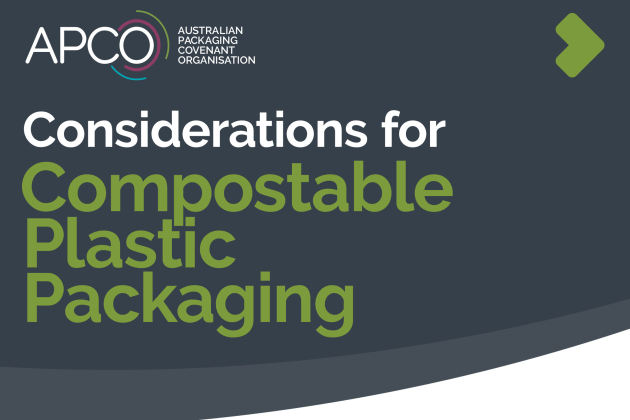The Australian Packaging Covenant Organisation (APCO), the Australasian Bioplastics Association (ABA), and the Australian Organics Recycling Association (AORA) have partnered to back a common approach to compostable plastic packaging.

APCO, in partnership with ABA and AORA, has published Considerations for Compostable Packaging, which aims to help businesses make informed choices when considering the use of compostable packaging.
Designed to cut through confusion, the practical new resource aims to help industry professionals – particularly brand owners, packaging technologists and designers, and food service providers – decide when and where to use certified compostable plastic packaging and associated items such as cutlery.
Based on the systems and infrastructure currently available, the guideline identifies the key potential applications and opportunities for certified compostable plastic packaging, with a strong emphasis on packaging that could also facilitate the collection of food waste. These include food caddy liners, fruit and vegetable stickers, and so-called “closed-loop” situations such as festivals.
Recommendations are also provided about how to correctly communicate with end consumers, including accurate certification and correct language for labelling and marketing. Statements to avoid are also highlighted, including the misleading terminology and greenwashing claims that contribute to unintentional litter and contamination of the mechanical recycling system.
APCO CEO Brooke Donnelly said the organisation was delighted to launch the new guideline – along with ABA and AORA – which will provide a clear and consistent approach to the packaging format going forward.
“With brands facing intense consumer pressure to move away from plastics, coupled with thousands of Australian food outlets turning to takeaway packaging formats for the first time, there’s never been a more important time for businesses to receive accurate and consistent information about compostable packaging,” Donnelly said.
“Compostable plastics currently account for around 0.1% of plastic packaging on market in Australia. Yet we know that it is a market that is growing and one that causes real confusion – for both industry and end consumers.”
ABA president Rowan Williams said the launch had been an excellent opportunity for peak industry bodies to collaborate on guidelines for industry and consumers.
“The collaborative nature of the work in getting this guideline out has been outstanding. The guidelines look up and down the value chain, at where the raw material comes from and also where the finished packaging will go to, such as organics recycling, in the future,” Williams said.
“The ABA, as custodian of the only verification scheme for claims of certified compostability to the Australian Standards, welcomes the advent of the guidelines and looks forward to continuing collaboration with APCO, AORA and industry stakeholders.”
AORA chair Peter Wadewitz said his association supports the use of AS4736 certified materials for the source separation of food waste in the home or in commercial settings.
“It is a suitable alternative to non-recyclable packaging,” Wadewitz said.
“Compostable coffee cups, capsules, and compostable bags can all be put through normal organic recycling processes without concern of contamination.”
Considerations for Compostable Packaging can be downloaded on the APCO website.





